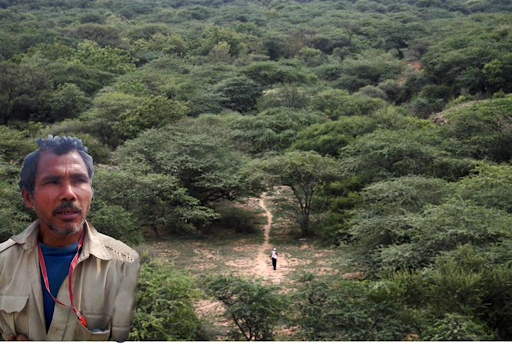
He is Jadav Molai Payeng an environmental activist who single-handedly carve-out an eroded barren land into a lush jungle. The 65 years old tribe doesn’t hold any environmental degree or educational qualifications. He did it by generous thought, indigenous knowledge, great foresight, soulful effort and grit.
The awe-inspiring journey unfolds with a conscious thought of Jadav’s sensible mind.
Jadav belongs to a small village Majuli a river island in the Bramhaputra river, Assam. In the year 1979, Assam witnessed a massive flood in the river Bramhaputra. The flash of flood eroded away 10 km long sandbar into a desert which was close to his village. The sandbar was a small but buzzing dockyard with a daily commute of ships. ships used to ferry goods to Kolkata and Dhaka.
Then 16 years old Jadav while wandering through the sandbar, encountered a large number of dead snakes laying on the sand and boulders what steered his compassion. The snakes had died due to excessive heat of post-flood in the denuded sandbar. The young mind resolved a thought to fill the barren land with trees and began by planting 20 Bamboo saplings. He kept this steadfast effort for 30 years what today is a 550 hectares dense forest and humble abode of many wild animals and birds. As a tribute to Jadav, the forest is officially called as Molai forest.

In 1979 social forestry division of Golaghat district launched a scheme of tree plantation on 200 hectares of land where Jadav worked as a labourer for 5 years till the end of the project. But even after the end of the project, he chose to stay over there and looked after the plants.
In those days Jadav met Jadabesh Barua, an agriculture scientist, who used to give him saplings of ‘paan leaf’ to plant with 25 paise pay. Moved by Jadav’s sincerity one day Barua asked him to plant trees for the profit of entire humanity. Already desperate Jadav for his deserted ‘Majuli’ agreed to take this responsibility and set out for the journey of afforestation. He made a small boat, every day he went to the sandbar, planted saplings and took care till they bloom into full-grown trees. Since then Jadav has donated his life for the upbringing of trees. His unwavering endeavour emerged as a rich forest.
Molai forest is now a shelter of animals like elephant, rhinoceros, tiger, deer, monkey and a number of birds. According to wildlife experts, the forest now attracts 80% of the world’s migratory birds.

Jadav Payengi lives in the forest accompanying by his wife and three children. He grows cereals, vegetables and fruits. Rears cattle and buffalos and sell their milk to meet his livelihood. Still active in his mission now Jadav is working to stretch the forest to another sandbar inside of Bramhaputra.
His effort noticed in 2008 when forest department officials were searching for a herd of 115 elephants those have retreated into the forest after damaging the property of a nearby village Aruna Chapori which is 1.5 km from the forest. The forest department surprised to see the expanded dense forest. Jadav Molai Payengi’s effort recognized and honoured.
Assam Agricultural University and Kaziranga University bestowed Doctorate degree for his contribution in forest conservation. In 2015, the Indian government conferred him ‘Padma Shri’ the fourth highest civilian award in India.

Jadav visits all over the world to share his story and to promote conservation of forests. But in the deepest corner of his heart, he craves to come back to his native and embrace his forest.
Padma Sri Jadav Payengi is now a part of the school syllabus in the United States. A chapter dedicated to Payengi has been included in the school curriculum of class VI of Greene Hills School in Bristol Connecticut. Students are studying Payengi as a part of their ecology lesson. The purpose is to inspire and encourage the future generation for afforestation and reforestation to save the forest of the earth.
From 7.8 billion minds on the earth, it’s Jadav Molai Payengi who understood ‘Trees are the lifeline for all’ and made his mind to do something meaningful for sake of the entire world. Let’s take a lesson from him and plant trees. Earth will survive without trees but we won’t.

